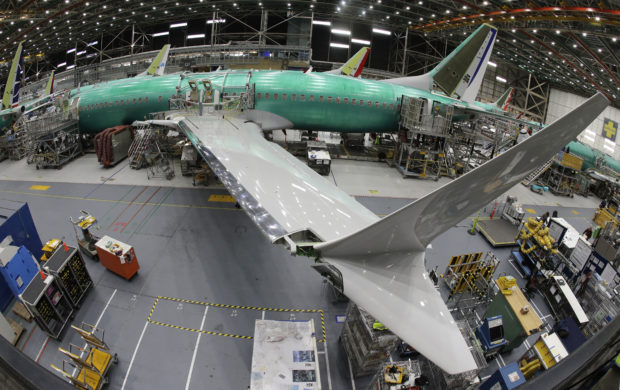
FILE- In this March 27, 2019, file photo taken with a fish-eye lens, a Boeing 737 MAX 8 airplane sits on the assembly line during a brief media tour in Boeing’s 737 assembly facility in Renton, Wash. Boeing is cutting production of its grounded Max airliner this month to focus on fixing flight-control software and getting the planes back in the air. The company said Friday, April 5, that starting in mid-April it will cut production of the 737 Max from 52 to 42 planes per month. AP
NEW YORK — Under growing scrutiny from investors and regulators, embattled US aerospace giant Boeing will have a chance this week to reset the narrative as it aims to pivot from two deadly crashes that have grounded a top-selling plane.
The company will report earnings on Wednesday for the first time since a deadly March 10 plane crash plunged the company into crisis-mode.
Then, on April 29, the company will face its shareholders at an annual meeting that includes challenges to the company on leadership structure and government lobbying disclosure.
The events come as Boeing’s 737 MAX remains grounded globally following March’s Ethiopian Airlines crash. Together with the Lion Air crash of October, accidents involving 737 MAX aircraft have claimed 346 lives.
Analysts have been waiting for Boeing to formally seek certification from the Federal Aviation Administration for a technical fix to get the planes flying again, a key step and one critical to Boeing’s bottom line.
Boeing chief executive Dennis Muilenburg could announce progress on this front during an earnings conference call, said a person close to the matter.
Adding to Boeing’s travails, The New York Times on Sunday published an expose claiming the company had left debris on 787 aircraft during manufacturing, potentially threatening safe operations, and printed allegations from former employees who said they had been punished for raising safety concerns.
In a note to employees, Boeing South Carolina Site Leader Brad Zaback denounced the article as a “skewed and inaccurate” picture of the 787 program, adding that “quality is the bedrock of who we are.”
But Scott Hamilton of the aviation consultancy Leeham Company said the 787 issues, coupled with Boeing’s other woes, raised the possibility Boeing is facing systemic problems.
“There is no simple answer, nor is there a quick one,” Hamilton told AFP in an email. “Boeing has to improve its quality control and it has to be transparent and detailed with airlines, lessors and regulators in the MAX fix.”
Further profit hit?
Financial analysts have already slashed their 2019 profit forecasts after Boeing announced on April 5 it was cutting its monthly production of the 737 by about 20 percent. Lower plane deliveries directly affect revenues.
But analysts will want to gauge whether to lower expectations further due to the hit from the production cut or because of other impacts, such as compensation to airlines that have been forced to ground their planes.
Other front-of-mind questions include whether the company expects more order cancelations and the seriousness of government probes, including a US criminal investigation.
Analysts have varied in their assessments of the impact to Boeing’s long-term prospects.
Bank of America Merrill Lynch this month downgraded Boeing shares and slashed its profit forecast for the next four years, citing a “reputational loss” treats to long-term market share.
But Morningstar predicted Boeing would be able to lift 737 MAX production after moving past the current rough patch, concluding that “Boeing’s ability to generate returns above its cost of capital will remain strong well into the next decade and most likely beyond.”
Shareholder rebuke?
This year’s annual gathering comes at a vulnerable moment for the company.
The yearly meeting can become a forum for venting shareholder fury at company missteps, as companies such as Wells Fargo and General Electric have discovered in recent years.
Boeing also faces the risks of an embarrassing rebuke by investors if more than 50 percent side with a shareholder proposal for the company to make its chairman an independent director, a shift from the current structure in which CEO Muilenburg also serves as director.
Boeing has fought the proposal, even though it would give the board discretion on the timing to implement the idea, meaning it could be phased in for the next CEO after Muilenburg.
Institutional Shareholder Services, which opposed the same proposal last year, reversed its position and urged support from shareholders in light of the current problems.
“The company faces serious challenges in regaining the confidence of regulators, airlines, pilots and passengers worldwide,” ISS said in a note to clients.
“Any missteps in the process of remediating the issues and open questions that have led to the grounding of the 737 MAX, or any repeat of the problems in future aircraft programs, could have a devastating impact on the company’s prospects, its band and its reputation, for years.”
ISS also backed a shareholder proposal to require Boeing to disclose its lobbying activities and trade association memberships. Supporters of the proposal have cited the crashes as sharpening the need for transparency.
“I think if the resolution receives the support we hope it receives will be part of the solution to the moment we’re facing,” said Robert Wotypka, corporate responsibility agent for the Province of Saint Joseph of the Capuchin Order, a shareholder.